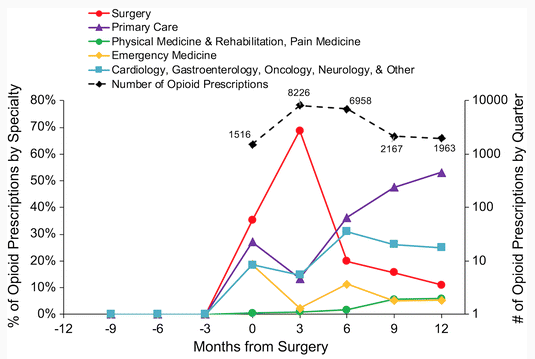More than six percent of surgical patients who received opioid painkillers – but had never taken them previously – developed a "persistent habit" or addiction after the normal recovery period for taking them ended.
That's a key finding from a newly-published paper that reviewed insurance claim data for a recent six-year period. This nationwide retrospective study focused on adults in the United States between the ages of 18 and 64 who underwent surgery and filled post-operative opioid prescriptions. Both major and minor surgeries were included in the project.
The study, entitled "Transitions of Care for Postoperative Opioid Prescribing in Previously Opioid-Naïve Patients in the USA: a Retrospective Review," was conducted by researchers at the University of Michigan and published online Tuesday in the Journal of General Internal Medicine.
"Millions of Americans each year are continuing opioid use beyond the normal recovery period of 90 days after a surgical procedure," said Michael Klueh, the study's lead researcher at U of M's Department of Surgery.
However, it's important to note an essential distinction between implying that this behavior is an addiction – which it isn't necessarily – as opposed to saying the medication is being used "beyond the normal recovery period."
"Unfortunately, Mr. Klueh's comment is an example of selection bias. Instead of interpreting the data as evidence that these people are addicts, you could look at it and come to a different conclusion," says Dr. Josh Bloom, the Senior Director of Chemical and Pharmaceutical Sciences for the American Council on Science and Health.
"Some of these surgical patients are going to have procedures – say, for example, disc fusion – that not only didn't work, but also made their pain worse," Dr. Bloom added. "Naturally, in these cases, the patient is going to be on the painkillers for longer because they will have more pain. So in the context of this study, it's important not to categorize prolonged opioid use as addiction."
 Of roughly 88,000 so-called "opioid-naive" adults – those never previously exposed to a painkiller – that had medical coverage and underwent surgery between 2008 and 2014, researchers "identified 5276 opioid-naïve patients who developed new persistent opioid use ... 3 to 6 months after surgery," according to the study. As for who approved the continued medication, "[d]uring the first 3 months after surgery, surgeons accounted for 69% of opioid prescriptions, primary care physicians accounted for 13%, Emergency Medicine accounted for 2%, Physical Medicine & Rehabilitation (PM&R)/Pain Medicine accounted for 1%, and all other specialties accounted for 15%." (Table courtesy: Society of General Internal Medicine 2018)
Of roughly 88,000 so-called "opioid-naive" adults – those never previously exposed to a painkiller – that had medical coverage and underwent surgery between 2008 and 2014, researchers "identified 5276 opioid-naïve patients who developed new persistent opioid use ... 3 to 6 months after surgery," according to the study. As for who approved the continued medication, "[d]uring the first 3 months after surgery, surgeons accounted for 69% of opioid prescriptions, primary care physicians accounted for 13%, Emergency Medicine accounted for 2%, Physical Medicine & Rehabilitation (PM&R)/Pain Medicine accounted for 1%, and all other specialties accounted for 15%." (Table courtesy: Society of General Internal Medicine 2018)
The insurance data came from the Optum Clinformatics Data Mart, which is comprised of information from health plans from all 50 states, as well as the District of Columbia and Puerto Rico. In order to be counted in the study, "patients must have maintained insurance coverage during the 12 months before and after their date of surgery."
That being the case, that gives rise to a few questions: What effect, if any, did the insurance requirement have on the study's results? By having coverage, did that make additional prescriptions for painkillers easier to get? Or given the nature of the drug being studied – that it easily can be habit-forming – would this prolonged consumption still have taken place regardless of the subsidized cost of insurance? Or, worse, might it have morphed into a street-drug habit? For all of these situations, it's hard to say.
So while the insurance coverage constitutes a limitation of sorts, the key takeaway from this study is that while it appears that a "persistent habit" or "addiction" is being implied for patients that continue to take painkillers more than the normal 90-day period after surgery, we should make sure to avoid categorizing those patients as addicted. It's more complicated than that.




